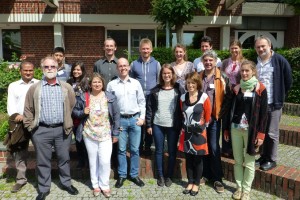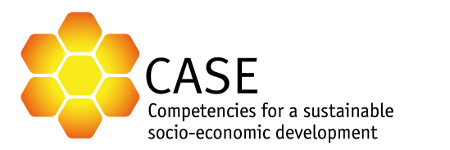International CASE Workshop on inter- and transdisciplinary teaching methods at the University of Vechta
 On Tuesday, July 28, 2015, 20 participants from seven countries came to the University of Vechta for a workshop on inter- and transdisciplinary teaching methods. The workshop was held under the EU-funded project “CASE – Competencies for a Sustainable Socio-Economic Development”. Best practice examples of inter- and transdisciplinary teaching approaches of the participants were presented.
On Tuesday, July 28, 2015, 20 participants from seven countries came to the University of Vechta for a workshop on inter- and transdisciplinary teaching methods. The workshop was held under the EU-funded project “CASE – Competencies for a Sustainable Socio-Economic Development”. Best practice examples of inter- and transdisciplinary teaching approaches of the participants were presented.
The workshop started via a visualisation of the CASE project in a systemic constellation, which was led by Prof. Georg Müller-Christ of the University of Bremen. Afterwards various participants presented good teaching examples from different universities: the inter- and transdisciplinary project course “Sustainability Challenge” at the University of Economics and Business in Vienna (Austria), the “Sustainability Business Model Canvas” at the University of Natural Resources and Life Sciences , Vienna, the “Yooweedoo-idea contest” with the “Changemaker”- online course at the University of Kiel, the Eco-incubator and a summer school at the Masaryk University in Brno (Czech Republic), as well as project-oriented modules on issues of sustainable development at the University of Vechta.The feedback from the participants at the end of the day was highlighting the inspiring inputs and the valuable atmosphere for creating many new ideas for learning and teaching methods as well as the fruitful exchange.
The aim of the CASE project is to develop – together with ten European partner universities and business partners – inter- and transdisciplinary modules for a European Master’s degree programme ‘Sustainable Entrepreneurship’. “To educate ‘Sustainable Entrepreneurs’ for us means, to empower people with innovative ideas for a sustainable socio-economic development, so that they implement these ideas with solid business models and thus contribute to social transformation,” explains project leader Christian Rammel from the Vienna University of Economics and Business.
The project places high demands on the teaching methods which will be applied later in the Master’s programme. Students need practical experience in order to acquire skills and competencies for contributing to a sustainable development in society. “These skills cannot be taught but must be developed by the students themselves,” explains Prof. Marco Rieckmann, Assistant Professor of Higher Education Development at the University of Vechta and leader of the work package “teaching and learning methods” in the CASE project. The central question of the workshop was which methods are particularly suitable for such competence development.

